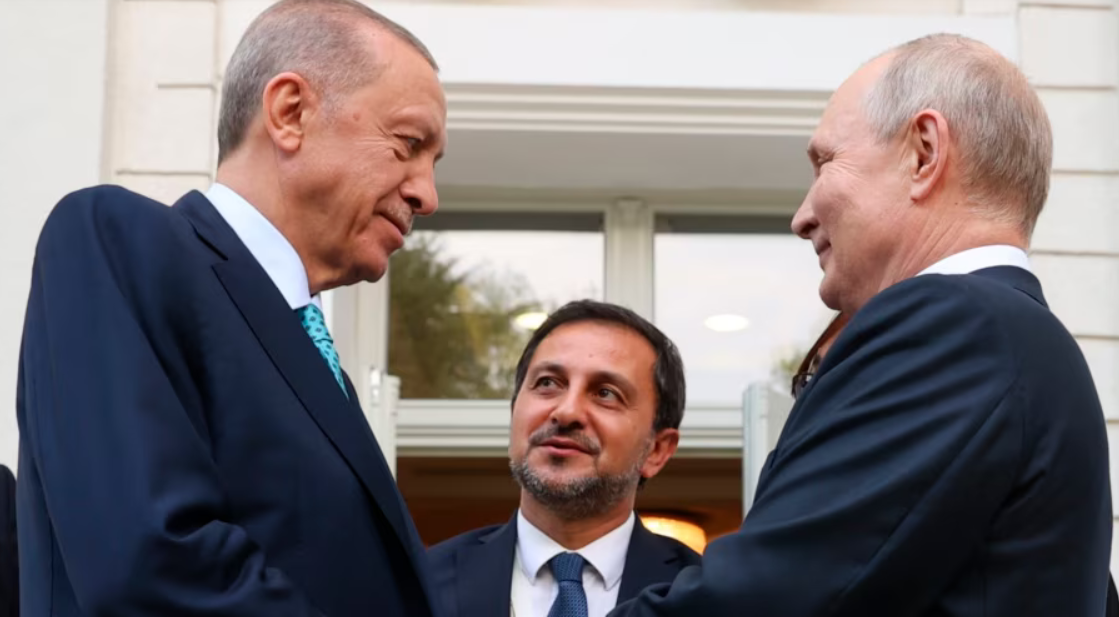The Astana Summit of the Shanghai Cooperation Organisation (SCO) starts today.
The 24th summit in the capital of Kazakhstan will be attended by the leaders of member states Russia, China, Kazakhstan, Kyrgyzstan and Tajikistan, India, Pakistan and Iran, as well as the leaders of Belarus, Mongolia, Azerbaijan, Qatar, the United Arab Emirates, Turkmenistan and Turkey, which are dialogue partners of the organisation.
President Erdoğan is expected to hold a meeting with Russian President Vladimir Putin today on the sidelines of the summit.
Putin’s adviser said: “Important and sensitive issues will be discussed at the meeting”
Kremlin Foreign Policy Adviser Yuri Ushakov confirmed the meeting in a statement in the Russian capital Moscow yesterday.
“A visit to Turkey has been planned for a long time. I think the two leaders will discuss this issue. I also think that, given Turkey’s position, there are many issues on which the leaders of countries that play a very important role, especially in the region, will exchange views. We are in constant dialogue with the Turkish side, there is constant contact via telephone. Recently, Putin received the Turkish Foreign Minister. All important and sensitive issues will be discussed at the meeting,” he said. While the developments in Ukraine, Turkey’s planned new nuclear power plant and Putin’s visit to Turkey are expected to be discussed in the Erdogan-Putin meeting, among the “important and sensitive” issues referred to by the Kremlin Foreign Policy Advisor, Syria stands out the most.
The obstacle in the way of Erdogan-Assad meeting: Euphrates Shield Region
On June 30, President Erdoğan announced that a meeting with Syrian President Bashar al-Assad might take place. In fact, the groundwork for a meeting between Erdoğan and Assad has been prepared for more than two years. However, the Syrian government requires Turkey to agree to withdraw from the territories it controls in Syria in order for this meeting to take place. On August 24, 2016, the Turkish Armed Forces (TSK) launched Operation Euphrates Shield, followed by Olive Branch, Peace Spring and Peace Shield operations in the following years. The Turkish Armed Forces militarily control northern Syrian cities such as Jarabulus, al-Bab, Azaz and Tal Abyad, along with Idlib.
Erdogan’s message to Putin and Assad on Northern Syria: “We will do our part when the separatist terrorist threat is completely eliminated”
However, in his remarks after yesterday’s cabinet meeting, President Erdoğan pointed to the PYD/YPG presence in northern Syria and said that Turkey would not accept such a precondition at this stage.
The President said, “Turkey’s presence in Syria is the biggest barrier in front of the plans to establish a terrorist state. We know very well that the imperialists who tear our geography into pieces with a divide-and-rule approach are disturbed by this, and we will continue to disturb them. We will continue to ensure the security of our country and our nation as long as there are bloody thugs with the barrels of their guns pointed at our country. When the threat of separatist terrorism is completely eliminated, of course we will do our part. We have no eyes on anyone’s land, we have no eyes on anyone’s sovereignty, we only protect and will protect our homeland against separatist intentions.”
Anti-refugee sentiment grows in Turkey
But the Syrian issue is also pressuring the government at home. Protests against Syrian refugees, which started in Kayseri after a child abuse case last Sunday, were also seen in provinces such as Gaziantep and Hatay.
The lowering of Turkish flags in Azaz, a Syrian city under the control of the Turkish Armed Forces, has also raised reactions.
Interior Minister Ali Yerlikaya announced that 474 people were detained in “provocative protests carried out through illegal means”.
Some Syrian agricultural workers in Hatay held a one-day work stoppage yesterday amid growing anti-refugee sentiment.
CHP calls on Erdoğan before his visit to Russia: “The normalization process with the Assad regime must continue”
The Republican People’s Party issued a 10-point statement on the recent events in Syria and Turkey, calling for restraint and asking the government to continue the normalization process with the Assad regime.
“Turkey’s Middle East policy, Syria policy and refugee policy have collapsed and bankrupt. Erdoğan and the AKP government are primarily responsible for this grave situation. The government has not only failed to solve the Syrian crisis it caused but has also made Turkey a prisoner of this crisis. While Erdoğan has caused the destruction of Syria with his policy and turned Turkey into the world’s refugee depot, he has not hesitated to negotiate with Europe over the lives of these people. The Erdoğan government should immediately publish a realistic and feasible road map for the solution of the problem, including the repatriation of asylum seekers.”
Foreign Ministry’s response to CHP: “Proxies of sovereign powers trying to penetrate our region”
The Ministry of Foreign Affairs responded to the CHP’s 10-point statement with a harsh written statement this morning.
“In democracies, it is of course possible to contribute to foreign policy through constructive criticism. However, distorting the facts and making accusations based on ideological bigotry for the sake of political rent cannot be considered within this scope. Turkey has managed to become an island of peace and stability in a geography that has been deliberately turned into a ring of fire for years. It should not be overlooked that those who ignore all these facts and make baseless accusations solely for political gain have become the proxies of sovereign powers trying to penetrate our region.”
Hilmi Hacaloğlu/ VoA
